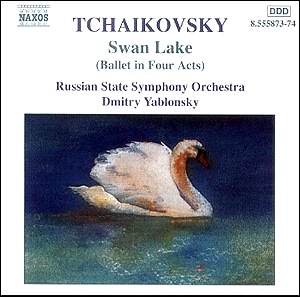It is always difficult, I think, to review a
recording of an immensely popular and perhaps somewhat hackneyed
work such as Swan Lake.
I looked up the Amazon CD site and discovered
that there were 173 entries for this ballet. Admittedly most of
them are excerpts and not complete recordings. However it gives
some impression of the scale of the popularity of this work. Most
people know at least the purple passages from this early masterpiece.
I have not listened to many recordings of this work so I am not
able to provide a comprehensive list of comparisons. My knowledge
is limited to the fine Richard Bonynge (Decca 473 283) and Andre
Previn (EMI 5 73624) recordings which I have known for some time,
both being recorded in the early 1970s.
A quick look at the Naxos catalogue reveals that
this company also has another recording on its books - that by
Ondrej Lenard (8.550246-247). I have not heard that version.
It seems almost churlish to retell the story
of the ballet, as it is probably well known to all but the most
detached of ballet lovers. However just for the record, my one
paragraph synopsis will have to suffice!
It is concerned with love and a girl called Odette.
She is transformed by the wicked Rothbart into a swan. She is
saved from death by the exertions of Siegfried who has fallen
in love with her during the few hours each night she is restored
to human form. There are two endings to the story - one where
Odette and Siegfried have a 'happy ever after' sort of life and
the other where they drown.
A brief review is not the place to give a résumé
of the complex history of this work; enough to say that it was
Tchaikovsky's first major ballet score. It was based on a German
fairy tale that appealed strongly to his imagination. The first
production was at the Bolshoi Theatre in 1877. It is interesting
to note that it was not an immediate success. It is also useful
to remember that the composer was seriously influenced by the
French composer, Léo Delibes of Coppelia and Sylvia
fame.
So now we turn to consideration of the CD in
hand.
The first question to be asked is quite simply:
Is there room in the catalogue for yet another recording, no
matter how good?
This is always a difficult question. On the one
hand we do not want the CD market overstretching itself; diluting
the number of CDs bought to such an extent that numbers sold are
not viable. Competition is a good thing, but perhaps it can become
too much. There are only a few people out there who will buy every
new recording of a particular work. Most of us settle for one
or perhaps two. And then there is a steady stream of new buyers
seeking their first copy of this ballet. On the other hand it
is good that CD companies are constantly trying to revisit music
for the present age. Each new generation of conductors brings
the light of recent scholarship and current thinking about instrumentation,
cuts, repeats and tempi of a given work. This is all admirable
and essential. So on balance I welcome 'yet another recording.'
The physical presentation of this Naxos CD is
very good. The historical notes are a bit on the short side, however
the synopsis of the ballet is excellent. I have no complaints
about the sound or the playing of the Russian State Symphony Orchestra
under their conductor, Dmitry Yablonsky. It is superb.
One of the features about this particular recording
is the symphonic feel to the performance. It is as if the conductor
has conceived it as a tone poem or perhaps even as a symphony
(four acts - four movements!). Now this is perhaps no bad thing.
Not everyone is enamoured with the full panoply of balletic convention.
'Men in tights' as one of my less sophisticated colleagues would
say do not appeal to everyone. Now, of course I do not entirely
agree - but there is enough residue of sixth-form humour in me
to have some sympathy with this view.
With Yablonsky's version of this great work we
can enjoy it (if we choose) as a kind of Straussian (Richard)
tone poem. The ‘plot’ is fundamentally about the striving of a
'superhero' against evil and allowing him to triumph through the
power of love.
So how does Yablonsky’s version compare to the
other recordings? Well, Bonynge is operatic in his conception
rather than symphonic. Previn for me brings greater excitement
than Yablonsky, but once again it is predicated on having sight
as well as hearing stimulated. One mentally has to supply the
dancing with Previn.
What we have in this Naxos recording is a fine
concert performance that allows us to concentrate on the music
without having to superimpose movement, colour and narrative.
Although we can if we want to - and it is excellent too!
John France
